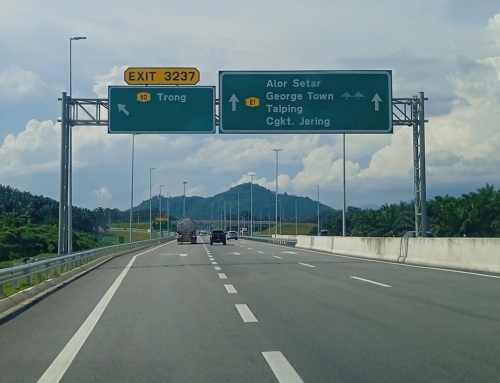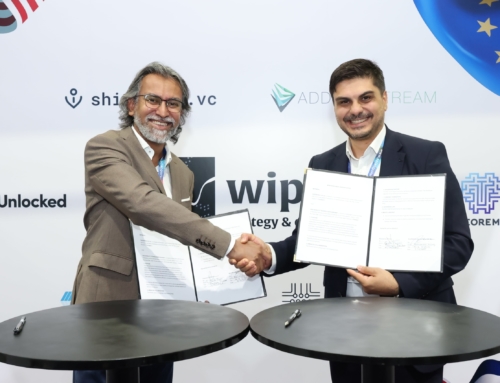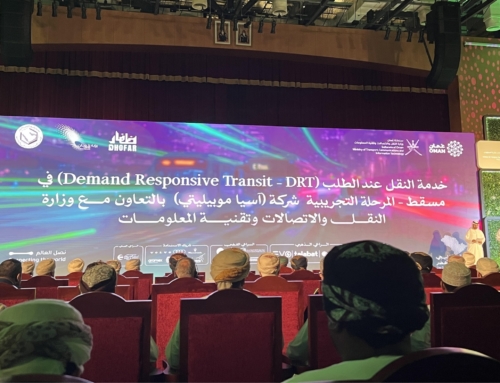Pioneering Data-Driven Approach to Advance Sustainable, Multimodal Mobility in Urban Centres
MADRID and KUALA LUMPUR, November 18th 2024: Asia Mobiliti, Malaysia’s leading Mobility-as-a-Service (MaaS) technology and digital city solutions provider with the Blue Diplomacy and Circular Economy Research Line of the School of Civil Engineering at the Polytechnic University of Madrid (Universidad Politécnica de Madrid ‘UPM’) are pleased to announce the completion of a research collaboration aimed at optimising electric vehicle (EV) charging infrastructure to support sustainable, multimodal urban mobility. The project focused on developing a data-driven analytics framework that could guide the strategic placement of EV chargers, using Kuala Lumpur as the initial test city.
This innovative framework incorporates predictive power demand models built upon the mobility patterns of Kuala Lumpur, mapped against key points of interest and the city’s public transport network. The analysis was used to determine optimal locations, types, and quantities of EV chargers needed, offering a blueprint for cities seeking to enhance their electric mobility networks. This approach provides actionable insights for city planners and Charging Point Operators (CPOs) as they expand EV infrastructure, aligning with sustainable urban growth initiatives.
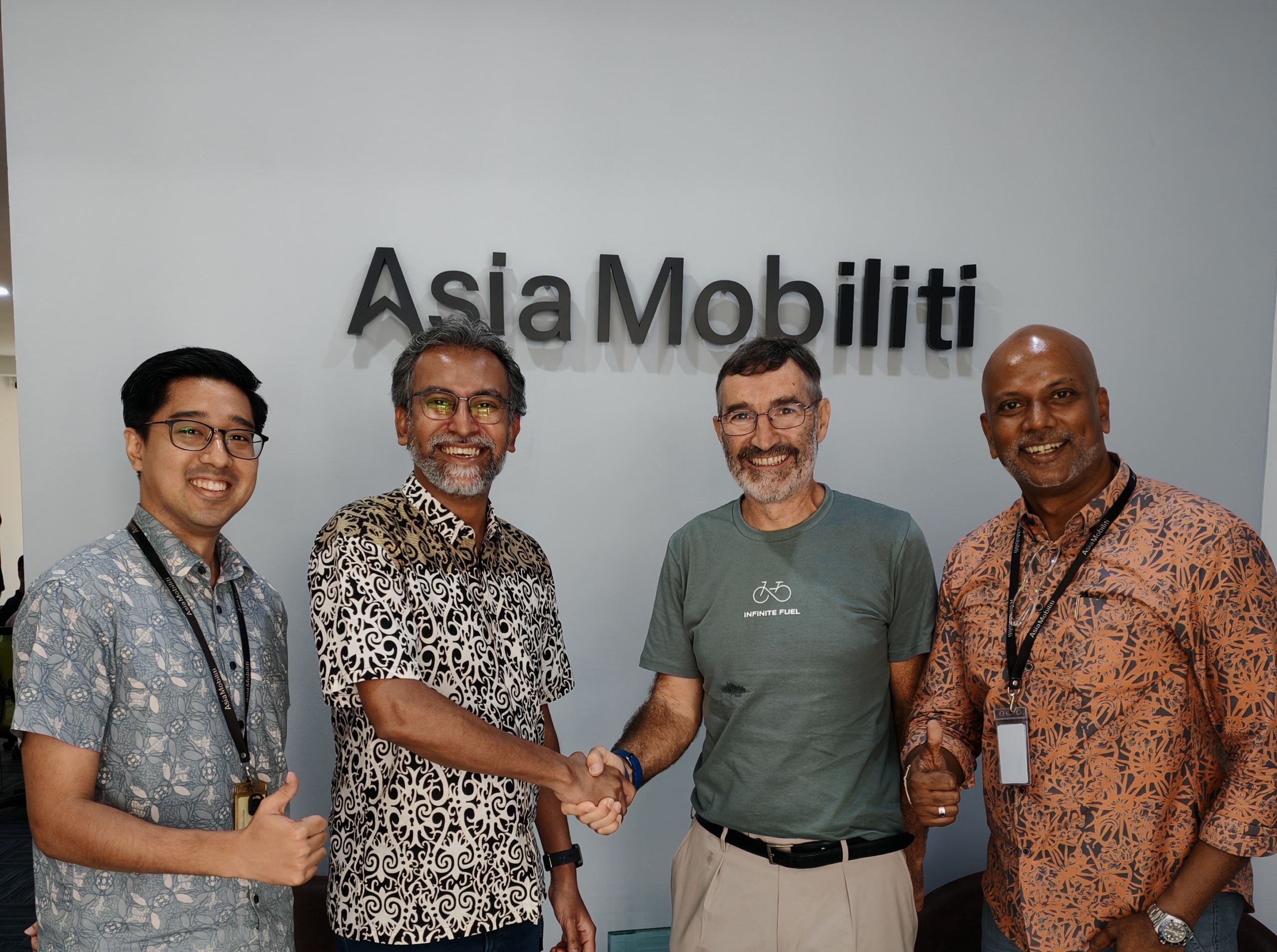
From left to right: Jonah See, Solutions Architect at Asia Mobiliti; Ramachandran Muniandy, CEO & Co-founder of Asia Mobiliti, Pedro Fernández Carrasco, research supervisor and Senior Lecturer leading the research line in Blue Diplomacy and Circular Economy; and Vicks Kanagasingam, Chief Commercial Officer of Asia Mobiliti.
Ramachandran Muniandy, CEO and Co-founder of Asia Mobiliti, commented, “Our collaboration with UPM marks a significant advancement in data-driven urban planning. By leveraging detailed mobility data, we’ve created a framework that not only identifies high-demand areas for EV charging but also integrates seamlessly with public transport networks, promoting a more connected and sustainable multimodal transit ecosystem.”
The success of this collaboration has laid the foundation for a new global data service from Asia Mobiliti, offering valuable insights to cities worldwide that are prioritising electrification as part of their sustainability agenda. This new service aims to support urban centres in addressing the challenges of EV infrastructure placement and demand prediction, providing a scalable solution adaptable to cities of varying sizes and transit needs.
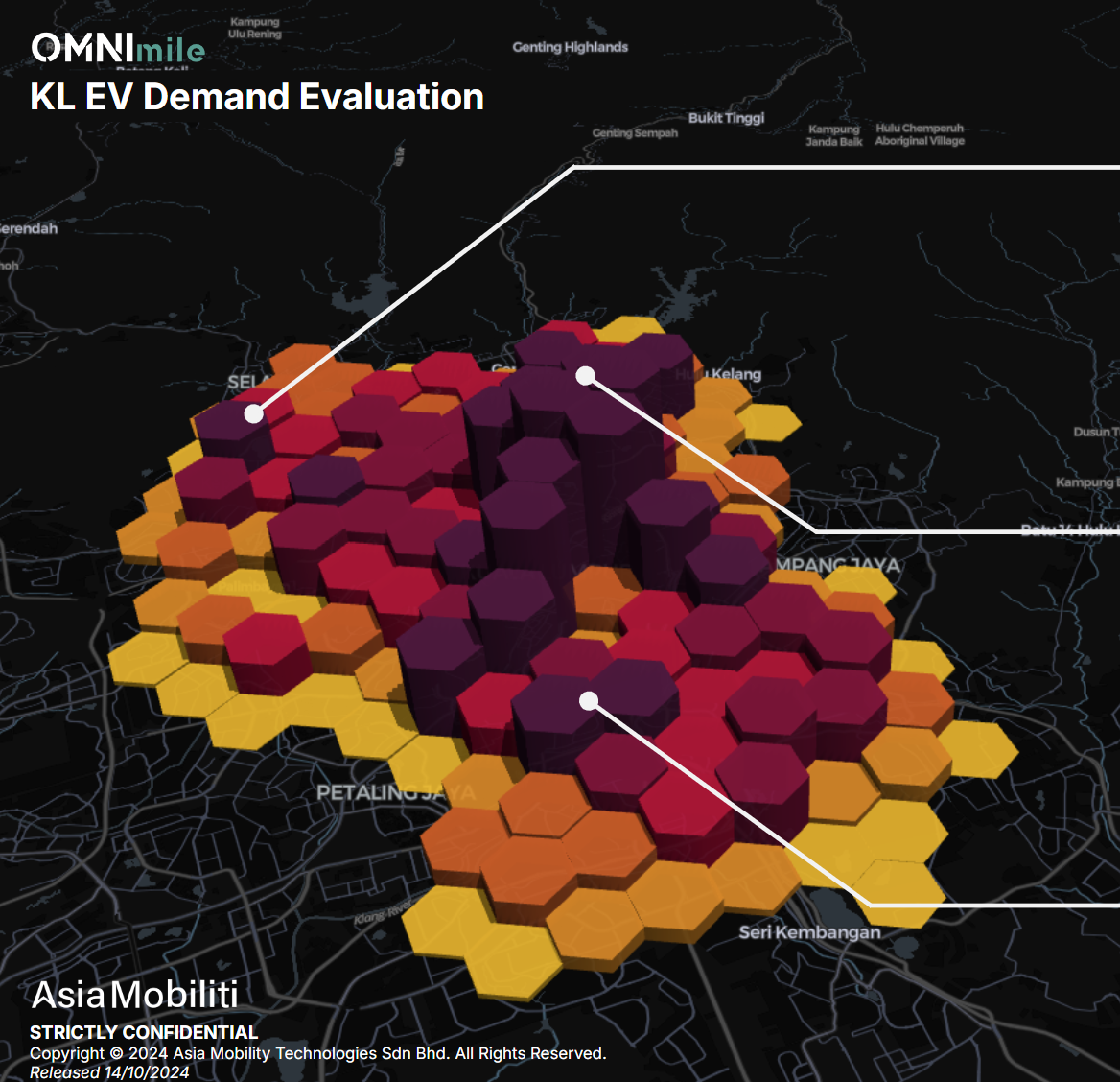
An example from the visualisation dashboard generated from the predictive model developed for EV power demand evaluation in Kuala Lumpur.
Prof. Pedro Fernández Carrasco, research supervisor and Senior Lecturer leading the research line in Blue Diplomacy and Circular Economy, highlighted the unique opportunity this collaboration provides for academic institutions like UPM to apply theoretical knowledge to real-world scenarios. “Working with Asia Mobiliti allows young talents to develop their skills within a highly qualified team at the forefront of technological innovation, bridging the gap between academia and industry. The significance of UPM’s partnership with the ASEAN region, particularly with Malaysia, is a key step in fostering international research connections that drive sustainable development and contribute to the advancement of smart urban solutions”, he adds.
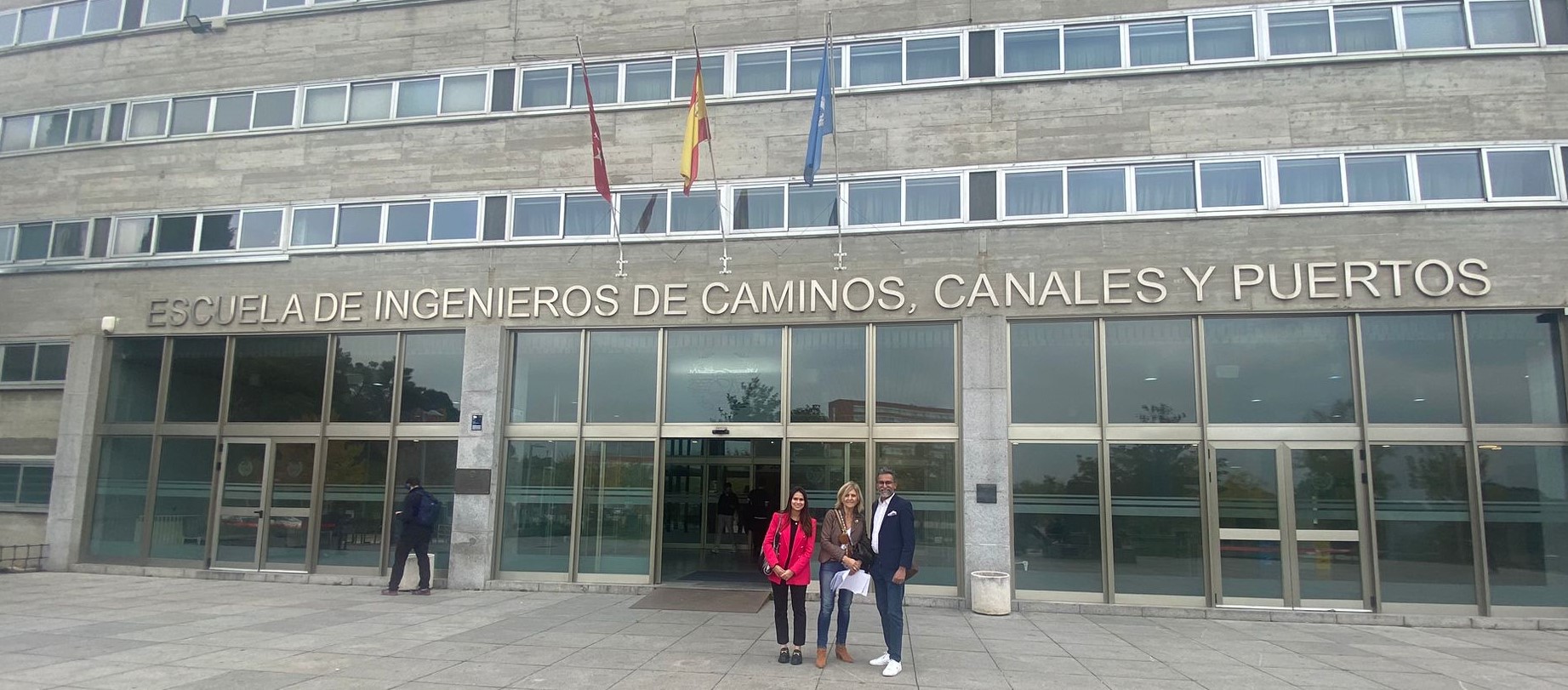
From left to right: Candela Martín blanco, postgraduate research student; Prof. María Eugenia López-Lambas, Head of Urban Mobility at Transyt, and Ramachandran Muniandy, CEO & Co-founder of Asia Mobiliti at the School of Civil Engineering, Polytechnic University of Madrid, Spain.
The research collaboration was supported by Asia Mobiliti and UPM’s in-house expertise and proprietary technologies, utilising specialised resources and knowledge from both teams. Investment in such postgraduate-level research typically represents a substantial commitment of resources, underscoring both organisations’ dedication to advancing innovative solutions for urban mobility.
This framework is expected to significantly impact the EV charging industry, offering CPOs the data they need to make informed decisions on infrastructure investments and enabling them to scale up more effectively. By providing an optimised approach to charger deployment, Asia Mobiliti and UPM’s research collaboration paves the way for a new era of investment in EV infrastructure that will benefit both public and private stakeholders.
With the research now completed, publication of the findings is scheduled soon, bringing valuable insights to the broader industry and showcasing a model for sustainable, data-driven urban planning.
About Asia Mobiliti
Founded in 2018 and based in Kuala Lumpur, Malaysia, Asia Mobiliti is an award-winning, Malaysia Digital status company providing a Mobility-as-a-Service (MaaS) platform and digital city solutions designed and engineered for the developing world. We adopt a technology platform approach with a core software-defined engine that is capable of spawning innovative mobility solutions that encompass Internet of Things (IoT)-enabled advanced telematics, machine learning-based mobility-as-a-service technology, as well as a wide variety of transit technologies, such as demand-responsive transit, transport service analytics, condition monitoring for rail and road and account-based ticketing and payments.
About Universidad Politécnica de Madrid
The Universidad Politécnica de Madrid (UPM) is one of Spain’s leading technical universities, recognised for its excellence in engineering, architecture, and technology-related fields. Founded in 1971, UPM brings together faculties with a rich history, some of which date back over 200 years, combining tradition with a strong focus on innovation and research. This heritage fosters an environment that bridges academia with industry, and with numerous collaborations on both national and international levels, UPM contributes to advances in areas like sustainable development, digital transformation, and energy. The university’s commitment to global challenges ensures its students and faculty engage in impactful research projects that address critical issues facing society today.
For media enquiries, please contact:
Share This Story!
RELATED POSTS
Pioneering Data-Driven Approach to Advance Sustainable, Multimodal Mobility in Urban Centres
MADRID and KUALA LUMPUR, November 18th 2024: Asia Mobiliti, Malaysia’s leading Mobility-as-a-Service (MaaS) technology and digital city solutions provider with the Blue Diplomacy and Circular Economy Research Line of the School of Civil Engineering at the Polytechnic University of Madrid (Universidad Politécnica de Madrid ‘UPM’) are pleased to announce the completion of a research collaboration aimed at optimising electric vehicle (EV) charging infrastructure to support sustainable, multimodal urban mobility. The project focused on developing a data-driven analytics framework that could guide the strategic placement of EV chargers, using Kuala Lumpur as the initial test city.
This innovative framework incorporates predictive power demand models built upon the mobility patterns of Kuala Lumpur, mapped against key points of interest and the city’s public transport network. The analysis was used to determine optimal locations, types, and quantities of EV chargers needed, offering a blueprint for cities seeking to enhance their electric mobility networks. This approach provides actionable insights for city planners and Charging Point Operators (CPOs) as they expand EV infrastructure, aligning with sustainable urban growth initiatives.

From left to right: Jonah See, Solutions Architect at Asia Mobiliti; Ramachandran Muniandy, CEO & Co-founder of Asia Mobiliti, Pedro Fernández Carrasco, research supervisor and Senior Lecturer leading the research line in Blue Diplomacy and Circular Economy; and Vicks Kanagasingam, Chief Commercial Officer of Asia Mobiliti.
Ramachandran Muniandy, CEO and Co-founder of Asia Mobiliti, commented, “Our collaboration with UPM marks a significant advancement in data-driven urban planning. By leveraging detailed mobility data, we’ve created a framework that not only identifies high-demand areas for EV charging but also integrates seamlessly with public transport networks, promoting a more connected and sustainable multimodal transit ecosystem.”
The success of this collaboration has laid the foundation for a new global data service from Asia Mobiliti, offering valuable insights to cities worldwide that are prioritising electrification as part of their sustainability agenda. This new service aims to support urban centres in addressing the challenges of EV infrastructure placement and demand prediction, providing a scalable solution adaptable to cities of varying sizes and transit needs.

An example from the visualisation dashboard generated from the predictive model developed for EV power demand evaluation in Kuala Lumpur.
Prof. Pedro Fernández Carrasco, research supervisor and Senior Lecturer leading the research line in Blue Diplomacy and Circular Economy, highlighted the unique opportunity this collaboration provides for academic institutions like UPM to apply theoretical knowledge to real-world scenarios. “Working with Asia Mobiliti allows young talents to develop their skills within a highly qualified team at the forefront of technological innovation, bridging the gap between academia and industry. The significance of UPM’s partnership with the ASEAN region, particularly with Malaysia, is a key step in fostering international research connections that drive sustainable development and contribute to the advancement of smart urban solutions”, he adds.

From left to right: Candela Martín blanco, postgraduate research student; Prof. María Eugenia López-Lambas, Head of Urban Mobility at Transyt, and Ramachandran Muniandy, CEO & Co-founder of Asia Mobiliti at the School of Civil Engineering, Polytechnic University of Madrid, Spain.
The research collaboration was supported by Asia Mobiliti and UPM’s in-house expertise and proprietary technologies, utilising specialised resources and knowledge from both teams. Investment in such postgraduate-level research typically represents a substantial commitment of resources, underscoring both organisations’ dedication to advancing innovative solutions for urban mobility.
This framework is expected to significantly impact the EV charging industry, offering CPOs the data they need to make informed decisions on infrastructure investments and enabling them to scale up more effectively. By providing an optimised approach to charger deployment, Asia Mobiliti and UPM’s research collaboration paves the way for a new era of investment in EV infrastructure that will benefit both public and private stakeholders.
With the research now completed, publication of the findings is scheduled soon, bringing valuable insights to the broader industry and showcasing a model for sustainable, data-driven urban planning.
About Asia Mobiliti
Founded in 2018 and based in Kuala Lumpur, Malaysia, Asia Mobiliti is an award-winning, Malaysia Digital status company providing a Mobility-as-a-Service (MaaS) platform and digital city solutions designed and engineered for the developing world. We adopt a technology platform approach with a core software-defined engine that is capable of spawning innovative mobility solutions that encompass Internet of Things (IoT)-enabled advanced telematics, machine learning-based mobility-as-a-service technology, as well as a wide variety of transit technologies, such as demand-responsive transit, transport service analytics, condition monitoring for rail and road and account-based ticketing and payments.
About Universidad Politécnica de Madrid
The Universidad Politécnica de Madrid (UPM) is one of Spain’s leading technical universities, recognised for its excellence in engineering, architecture, and technology-related fields. Founded in 1971, UPM brings together faculties with a rich history, some of which date back over 200 years, combining tradition with a strong focus on innovation and research. This heritage fosters an environment that bridges academia with industry, and with numerous collaborations on both national and international levels, UPM contributes to advances in areas like sustainable development, digital transformation, and energy. The university’s commitment to global challenges ensures its students and faculty engage in impactful research projects that address critical issues facing society today.
For media enquiries, please contact:
